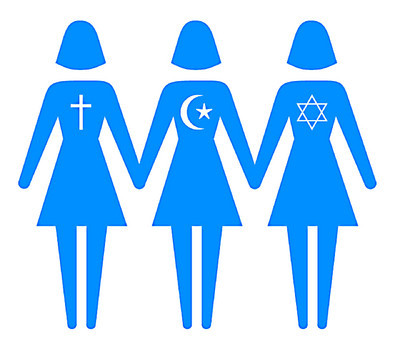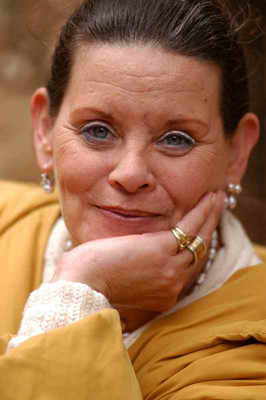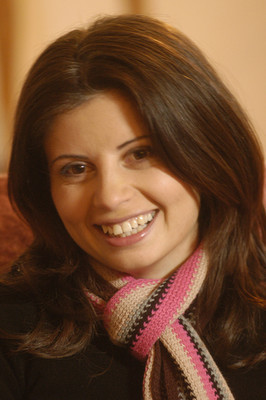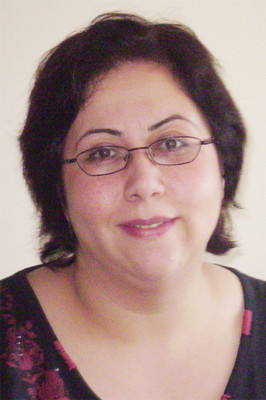One Vision
A Muslim Palestinian, a Christian Palestinian who's an Israeli citizen and a Jewish Israeli woman take a trip ...
It sounds like the set-up of a lame, probably nasty, joke. But there's nothing even remotely funny about the seemingly endless Israeli-Palestinian conflict, and it's that conflict, presented from perspectives Americans don't necessarily hear, that will bring Wejdan Jaber, Abir Kopty and Hagit Ra'anan to Las Vegas Sunday.
Jaber, a Muslim Palestinian, Kopty, a Christian Palestinian and Israeli citizen, and Ra'anan, a Jewish Israeli, will participate in a series of events in Southern Nevada through Tuesday as part of "Jerusalem Women Speak: Three Women, Three Faiths, One Shared Vision" sponsored by Partners for Peace, a Washington, D.C.-based nonprofit organization.
This year's edition of the tour -- it's the 14th such event Partners for Peace has sponsored -- began Oct. 27 in Washington and ends Nov. 18 in Los Angeles. During their speaking engagements throughout the tour, the women share with Americans personal perspectives and their own experiences, as well as their hope for peace in the Middle East.
During telephone interviews last week, the women said their goals are to raise awareness of various facets of the conflict -- many of which, they believe, Americans don't necessarily hear -- and tell Americans that there is cause for optimism in the Middle East.
But that doesn't mean the women agree about everything. In fact, said Kopty, 32, each of the women has her "own vision and own point of view about the conflict."
For Kopty, a Christian Palestinian and Israeli citizen, that point of view includes the discrimination Palestinians who live in Israel face.
Palestinians make up about 20 percent of Israel's population, said Kopty, who was born and raised in Nazareth and whose family had lived there for generations. However, Nazareth was annexed into the Israeli state in 1948.
Now, said Kopty, "we face discrimination inside Israel for being the national minority, for being Palestinians."
"This is the other story that I'm bringing to the American people," said Kopty, who has served as media coordinator for Mossawa, the Advocacy Center for Arab Citizens in Israel in Haifa.
Another of Kopty's goals will be to encourage Americans to not generalize about Arab people in the Middle East.
"I know many Americans hold negative perceptions" about them, she said. "So I ask Americans to look at Palestinians and hear all the voices. I think they only hear one side of the story."
Jaber, 39, a Muslim Palestinian from Gaza, lives in Ramallah and is a board members of an organization that works for human and women's rights. Jaber said she welcomes the opportunity to educate Americans about facets of the Middle East conflict that they may not now fully understand.
Only a few days into the tour, Jaber had begun to notice that some Americans don't hold as deep an understanding about events in the Middle East as they might.
"It's like in our talks and speeches we refer to things, and then we discover later that our audiences don't know much about this agreement or location, even in Palestine or Israel," she said. "So we have to sometimes give them a small introduction and background information."
But, at the same time, she is pleased that audiences do seem eager to learn more. Americans, she said, "want to know more about these places and stories of where we are from."
Audiences are "curious," Jaber said. "They want to know more, they want to stay in touch with us and (learn) more stories about our daily lives in Palestine and Israel."
Because of that, "I'm very impressed," she said. "I feel like it's really giving me hope."
The third member of the speaking tour, Ra'anan, 57, lives in the Tel Aviv district. Her grandparents were Zionists from the Ukraine and what is now Lithuania who left for Palestine during the 1920s, and her parents were members of a Jewish underground group during the late 1940s. At 18, Ra'anan served with the military in the Gaza Strip. She was unavailable for an interview last week.
In 1982, Ra'anan's husband was killed in combat near Beirut during the first week of the war in Lebanon. For the past seven years, she has been a member of the Bereaved Families Forum, which brings together bereaved Palestinians and Israelis to promote reconciliation and a political solution to end the violence, and is founder of an organization called Bridges of Peace.
But audience members aren't the only ones who are learning about different viewpoints in the Middle East through the speaking tour. The women didn't know each other before it began and they say that, because they come from such disparate backgrounds, they're learning more about one another, too.
"Actually, we are living in one place together," Jaber said. "It wasn't easy at the beginning because we just met and we have so many stories to tell each other before we started sharing it with the audience."
"We have disagreements among us, and it's challenging, actually," Kopty said. "And you have to sometimes listen to things you don't agree with, but you have to (maintain) respect. So it's kind of challenging."
And that, of course, is the point.
"Whether it's individual or international," Kopty said, "it's always important to meet people from the other side and talk to them."
What the women do agree on is that there is cause for optimism in the Middle East.
"We want to convey the message that there is hope for peace between Palestine and Israel," Jaber said. "We, the three of us, share one vision that there is enough land and resources and everything for two people to live together and in peace."
"We need to be optimistic, and this is what keeps me going," Jaber said. "I don't want to present myself or my people as victims of this conflict. We would like to present ourselves as survivors strong enough to have our independent state and be able to live in peace with all of our neighbors."
Optimism "is not easy in the Middle East every day," Kopty said. "But we feel optimism is our responsibility.
"In spite of all the problems, we want to move on forward and look for a solution that will result in a peaceful condition for Israel and the Palestinians."
Contact reporter John Przybys at jprzybys@reviewjournal.com or (702) 383-0280.




















